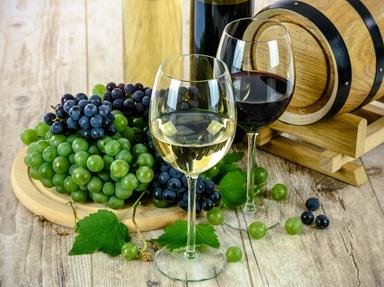Quiz Answer Key and Fun Facts
1. In an typical vintage of the early 21st century, the vineyards of Bordeaux will produce how much wine?
2. Wines have been produced in Bordeaux for about how long?
3. Most of the wine produced in Bordeaux is white.
4. There are many laws governing the production of wine in Bordeaux, and these laws are strictly enforced. For example, only six grape varieties can be used to produce red wines in Bordeaux. Which of the following is NOT one of them?
5. In 1855, the wines of the Medoc, a famous wine producing region within Bordeaux, classified its best wines into five categories: first growth, second growth, third growth, etc. Only four wines were considered good enough to be considered "first growths." Which of the following is one of them?
6. Most red Bordeaux wines are carefully cellared and are ready to drink when they are released for sale by the Chateau.
7. Bordeaux produces many refreshing white wines, especially from the Graves and Entre-Deux-Mers regions, but its most famous white is a sweet dessert wine. What is it?
8. Which Bordeaux property is known for having a famous artist design a different label for each vintage?
9. When selecting a bottle of Bordeaux, one important consideration is to choose a good vintage. Not all years are created equal. Which of the following years is considered to be a great vintage year in Bordeaux?
10. By now you may have decided that choosing a Bordeaux wine is just too complicated. There's an alternative to picking your way through the thousands of chateaux and memorizing the vintage chart. The largest selling Bordeaux wine doesn't come from a chateau at all. You've probably seen it at your local grocery store or wine merchant. It's not only the largest selling Bordeaux, it's one of the largest selling wines in the world. What's it called?
Source: Author
daver852
This quiz was reviewed by FunTrivia editor
WesleyCrusher before going online.
Any errors found in FunTrivia content are routinely corrected through our feedback system.


